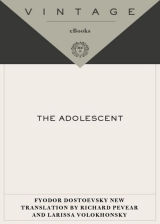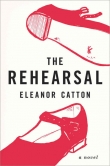
Текст книги "The Adolescent"
Автор книги: Федор Достоевский
сообщить о нарушении
Текущая страница: 45 (всего у книги 45 страниц)
33. The allusions are to the Franco-Prussian War (1870–1871) and the burning of the Tuileries (and much of the Louvre) in Paris under the Commune (1871).
34. Pétroleurswere incendiaries who used oil or kerosene ( pétrole) to start fires.
35. The reference is to the poem “ Frieden” (“Peace”), from the cycle Die Nordsee(“The North Sea”) in Das Buch der Lieder(“The Book of Songs”), by the German poet Heinrich Heine (1797–1856), which describes Christ’s return to earth and the regeneration of people under his love. Versilov (or Dostoevsky) changes the North Sea to the Baltic.
36. Versilov is probably referring to the soliloquy that opens Act V, Scene ii of Othello (“It is the cause, it is the cause, my soul”), not Othello’s last speech in lines 338–56 of the same scene (“Soft you! A word or two before you go”). “Evgeny at Tatyana’s feet ” refers to stanza XLI in the eighth and final chapter of Pushkin’s novel in verse Evgeny Onegin. The episode from Les Misérables(Part Two, Book Three) describes the meeting of the little girl Cosette with the escaped convict Jean Valjean.
37. It was customary in Russia to lay a dead person out on a table while waiting for the coffin to be prepared.
38. A panikhidais a memorial service for the dead, which may be held before as well as after the actual burial service.
39. See Part Two, note 25. The Old Believers, in their wish to hold on to all that had characterized the Russian Orthodox Church before the reforms of the patriarch Nikon, managed to preserve some of the finest old Russian icons.
40. See Part Two, note 28. As is often the case with Arkady’s allusions, the story of Abishag has no relation at all to what he is describing here.
41. A vogue for spiritualism, or spiritism, as it was originally called, swept through upper-class Europe, including the courts, in the late 1860s and early 1870s, when mediums and table-rapping séances became socially respectable. Tolstoy also refers mockingly to the vogue for spiritism in Anna Karenina, which was written at the same period as The Adolescent.
42. The von Sohn murder trial caused a stir in Petersburg in 1869– 1870. The elderly von Sohn was murdered in a brothel to the dancing and singing of the prostitutes; he was then put in a trunk and shipped to Moscow as baggage. Dostoevsky refers to the case again in The Brothers Karamazov.
43. An imprecise quotation of a line spoken apropos of Chatsky by the old lady Khlyostova in Woe from Wit(see Part One, notes 38 and 39).
44. Militrisa is the daughter of King Kirbit in The Tale of PrinceBova, a sixteenth-century Russian version of Beuves d’Hanstone, a thirteenth-century French chanson de gestethat was widely spread in Europe. Dostoevsky refers to the same tale again in The Brothers Karamazov.
45. In the Orthodox Church, Great Lent is the forty-day period of fast that precedes Holy Week (see Part Two, note 31). Preparation for communion at Easter would include eating lenten meals (no meat, eggs, or dairy products), confessing, and attending the services of Lent and Holy Week.
46. During the Bridegroom services that fall on the first three days of Holy Week, the hymn is sung which gives these services their name: “Behold! the Bridegroom comes at midnight, and blessed is the servant whom He shall find watching . . .”
47. Molchalin is the trivial and servile private secretary in Woe from Wit(see Part One, notes 38 and 39). Dostoevsky mentions Molchalin in his Diary of a Writerfor October 1876 (Chapter One, section 3), and adds parenthetically, “Some day I am going to dwell on Molchalin. It is a great theme.”
48. Nikolai Semyonovich is referring to Chapter Three, stanzas XIII–XIV, of Evgeny Onegin, where Pushkin says he may cease to be a poet and “descend to humble prose” in order to describe the “traditions of a Russian family, / love’s captivating dreams, / and manners of our ancientry,” and so on (Nabokov translation). Pushkin already speaks with a hint of irony here of the kind of novel that Nikolai Semyonovich advocates, and that Leo Tolstoy would go on to write. Dostoevsky was, of course, writing precisely the opposite kind of novel, and therefore appreciates Pushkin’s irony, which escapes both Tolstoy and Nikolai Semyonovich.
49. The radical socialist communards seized control of Paris following the insurrection of March 18, 1871, when the Prussians lifted their siege of the city after the defeat of France. They were overthrown in May of the same year.
50. Mother Mitrofania (Baroness Praskovya Grigoryevna Rosen in the world), the superior of a convent in Serpukhov, was convicted of passing counterfeit promissory notes for enormous sums and of forging a will, and sentenced to three years of exile in Siberia. According to the memoirs of Dostoevsky’s friend, the lawyer A. F. Koni, she was a woman of great intelligence and of a strongly masculine and practical character. Her trial caused a sensation in Petersburg.
ENDNOTES
1 “Organic collectivity” here is a translation of the nearly untranslatable Russian word sobornost, meaning a free, inner, organic “unity in multiplicity.” It is a central term in Russian religious philosophy, which drew much inspiration from Dostoevsky. A profound exploration of the meaning of sobornost, and one extremely pertinent to The Adolescent, is to be found in The Spiritual Foundations of Society, by the Russian philosopher Semyon Frank, translated by Boris Jakim (Ohio University Press, 1987).
2 Dostoevsky’s title in Russian is Podrostok, which means “adolescent.” Constance Garnett altered it to A Raw Youthin her translation, and that title has also been used most often in English critical writings on the novel.
3 See note to p. viii.
4 My poor boy!
5 Well!
6 Isn’t it so?
7 Eh, but . . . I’m the one who knows women.
8 They are charming.
9 I know everything, but I don’t know anything worthwhile.
10 But what an idea!
11 Dear boy, I love God . . .
12 It was stupid.
13 ;A residence.
14 There’s another one!
15 Unknown.
16 This infamous story!
17 What is not cured by medicines, will be cured by iron; what is not cured by iron, will be cured by fire.
18 The strictly necessary.
19 Hate in love.
20 Throughout the world and other places.
21 All genres . . .
22 We always come back.
23 You understand.
24 Say, my friend.
25 Spelling it all out.
26 When you speak of a rope [in the hanged man’s house].
27 This little spy.
28 Monstrous.
29 You’ll sleep like a little king.
30 On the way out.
31 But . . . that’s charming!
32 Well, finally . . . finally let’s give thanks . . . and I bless you!
33 Bad tone.
34 What the devil!
35 One fine morning.
36 Pawn shop.
37 Let’s break it off there, my dear.
38 That goes without saying.
39 Distortion of French renseignée, “informed.”
40 It’s comical, but that’s what we’re going to do.
41 But let’s drop that.
42 That depends, my dear!
43 For your pretty eyes, my cousin!
44 Be it said between us.
45 Very proper.
46 The poetry in life.
47 What a charming person, eh? The songs of Solomon . . . no, it’s not Solomon, it’s David who put a young girl in his bed to warm him in his old age. Anyhow, David, Solomon . . .
48 That young beauty of David’s old age—it’s a whole poem.
49; Warming-pan scene.
50 But follow your mother, then [ . . . ] He has no heart, this child.
51 Furnished rooms.
52 Here!
53 Poor boy!
54 You understand, my girl? You have money . . .
55 But you haven’t slept at all, Maurice!
56 Shut up, I’ll sleep afterwards.
57; Saved!
58 Never was a man so cruel, so Bismarck, as this being, who looks at a woman as a chance bit of filth. A woman, what is she in our epoch? “Kill her!”—that’s the last word of the Académie Française.
59 Alas, what good would it have done me to reveal it sooner . . . and wouldn’t I have gained just as much by keeping my shame hidden all my life? Perhaps it’s not honorable for a young woman to explain herself so freely in front of monsieur, but finally I’ll admit to you that if I were allowed to wish for something, oh, it would be to plunge my knife into his heart, but with my eyes averted, for fear that his execrable look would make my arm tremble and freeze my courage! He killed that Russian priest, monsieur, he tore out his red beard to sell it to a hair artist on the Blacksmiths’ [i.e., Kuznetsky] Bridge, just near the Maisonof Monsieur Andrieux—the latest novelties, articles from Paris, linen, shirts, you know it, don’t you? . . . Oh, monsieur, when friendship gathers wife, children, sisters, friends around the table, when a lively happiness enflames my heart, I ask you, monsieur; is any happiness preferable to that which everyone enjoys? But he laughs, monsieur, this execrable and inconceivable monster, and if it weren’t through the agency of Monsieur Andrieux, never, oh, never would I be . . . But what is it, monsieur, what’s wrong with you, monsieur?
60 By this furious and inconceivable monster.
61 Where are you going, monsieur?
62 But it isn’t far, monsieur, it’s not far at all, it’s not worth the trouble of putting on your shuba, it’s nearby, monsieur.
63 This way, monsieur, it’s this way!
64; He’s leaving, he’s leaving!
65 But he’ll kill me, monsieur, he’ll kill me!
66 Calumny . . . something of it always remains.
67 Notice.
68 Excuse me, my dear.
69 But let’s leave that.
70 Wait (in mispronounced French).
71 Mister prince, do you have a silver rouble for us, not two, but only one, if you will?
72 We pay you back.
73 In railway carriages.
74 ;Ah, you damned . . .
 Say, then, would you like me to crack your skull, my friend!
Say, then, would you like me to crack your skull, my friend!
75 My friend, here’s Dolgorovky, the other my friend [sic].
76 Here he is!
77 It’s him!
78 Mlle. Alphonsine, do you want to kiss me?
79; Ah, the little rogue! . . . Don’t come near me, don’t dirty me, and you, you big booby, I’ll chuck you both out the door, do you know that!
80 Mlle. Alphonsine, have you sold your bologne [deformation of bolognais]?
81 What’s my bologne?
82 Say, what is this gibberish?
83; I talk like a Russian lady on the mineral waters [sic].
 What’s a Russian lady on the mineral waters and . . . so where’s your pretty watch that Lambert gave you?
What’s a Russian lady on the mineral waters and . . . so where’s your pretty watch that Lambert gave you?
84 We have a silver rouble that we lent [sic] from our new friend.
85 We pay you back with much thanks.
86 Hey, Lambert! where’s Lambert, have you seen Lambert?
87 Sir (polite form of direct address in Polish).
88 Twenty-five roubles.
89 Farewell, my prince.
90 Very beautiful.
91 Put that in, and it changes the question.
92 Property is theft.
93 The truth’s in wine.
94 I’m a gentleman before all and I’ll die a gentleman!
95 Decree of fate.
96 Ah, good evening.
97 Well! . . . and what about friends?
98 What a bear!
99 Yes, yes . . . it’s a shame! A lady . . . Oh, you’re generous, you are! Don’t worry, I’ll make Lambert see reason . . .
100 Oh, I said he had a heart!
101 Isn’t it so, isn’t it so?
102 He always appeals to one’s feelings . . .
103; Afterwards, afterwards, don’t you think? My dear friend!
104 Yes, yes, he’s charming . . .
105 But it’s terrible what you say.
106 Isn’t it so? I don’t talk much, but I speak well.
107 That’s right.
108 He seems to be stupid, this gentleman.
109 Nothing, nothing at all . . . But I’m free here, am I not?
110 Dear Prince, we should be friends even by right of birth.
111 That’s my opinion!
112 She’s an angel, she’s an angel of heaven!
113 I say charming things and everybody laughs . . .
114 Dear child, I love you.
115 Yes, yes, I understand, I understood at the beginning . . .
116 That black man.
117 Madame the general’s wife.
118 Wait, I’ve forgotten his name . . . A dreadful man . . . Wait, Versiloff.
119; Oh, they will take their revenge!
120 Save her, save her!
121 You’re a pretty one, you are!
122 Scratch a Russian and you’ll find a Tartar.
ABOUT THE TRANSLATORS
RICHARD PEVEAR has published translations of Alain, Yves Bonnefoy, Alberto Savinio, Pavel Florensky, and Henri Volohonsky, as well as two books of poetry. He has received fellowships or grants for translation from the National Endowment for the Arts, the Ingram Merrill Foundation, the Guggenheim Foundation, the National Endowment for the Humanities, and the French Ministry of Culture.
LARISSA VOLOKHONSKY was born in Leningrad. She has translated works by the prominent Orthodox theologians Alexander Schmemann and John Meyendorff into Russian.
Together, Pevear and Volokhonsky have translated Dead Soulsand The Collected Talesby Nikolai Gogol, The Brothers Karamazov, Crime and Punishment, Notes from Underground, Demons, The Idiot, and The Adolescentby Fyodor Dostoevsky, and Anna Kareninaby Leo Tolstoy. They were awarded the PEN Book-of-the-Month Club Translation Prize for their version of The Brothers Karamazov, and more recently Demonswas one of three nominees for the same prize. They are married and live in France.
Copyright © 2003 by Richard Pevear and Larissa Volokhonsky
This translation has been made from the Russian text of the Soviet Academy of
Sciences edition, volume 13 (Leningrad, 1975).
Vintage is a registered trademark and Vintage Classics and colophon are trademarks
of Random House, Inc.
The Library of Congress has cataloged the Knopf edition as follows:
Dostoyevsky, Fyodor, 1821–1881.
[Podrostok. English]
The adolescent / Fyodor Dostoyevsky; translated from the Russian by Richard Pevear
and Larissa Volokhonsky; with an introduction by Richard Pevear.
p. cm.
Includes bibliographical references.
I. Pevear, Richard, 1943–. II. Volokhonsky, Larissa. III. Title.
PG3326.P5 2003
891.73’3—dc21
2003044885
www.vintagebooks.com
www.randomhouse.com
eISBN: 978-0-307-42811-0
v3.0



